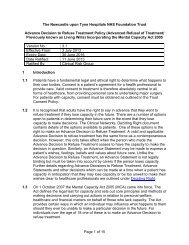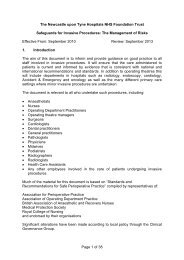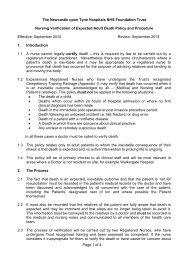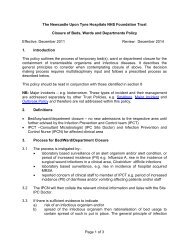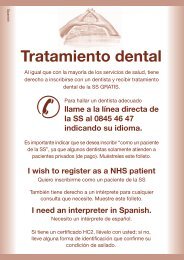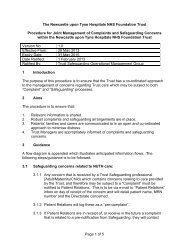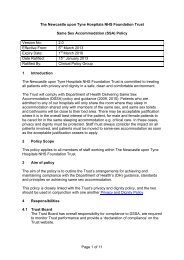Use of Patients' Own Drugs (PODs) - Newcastle Hospitals
Use of Patients' Own Drugs (PODs) - Newcastle Hospitals
Use of Patients' Own Drugs (PODs) - Newcastle Hospitals
Create successful ePaper yourself
Turn your PDF publications into a flip-book with our unique Google optimized e-Paper software.
The <strong>Newcastle</strong> Upon Tyne <strong>Hospitals</strong> NHS Foundation Trust<br />
<strong>Use</strong> <strong>of</strong> Patients’ <strong>Own</strong> <strong>Drugs</strong> (<strong>PODs</strong>)<br />
Version No.: 2.1<br />
Effective From: 1 May 2013<br />
Expiry Date: 30 April 2016<br />
Date Ratified: 17 April 2013<br />
Ratified By: Medicines Management Committee<br />
1 Introduction<br />
This Policy, in line with Audit Commission recommendations, supports the optimum,<br />
safe use <strong>of</strong> <strong>PODs</strong> and an overall reduction in medicines expenditure and waste.<br />
Benefits to nursing staff include a reduction in the amount <strong>of</strong> medicines to be<br />
ordered, fewer missed doses, and faster discharge (and therefore fewer complaints<br />
from patients). Assessment <strong>of</strong> POD may also be the first step in setting up a patient<br />
self administration scheme.<br />
The Pharmacy Department must be consulted / provide the required training before<br />
a POD assessment can take place on a ward.<br />
2 Policy Aim<br />
This Policy outlines how patients’ own drugs (<strong>PODs</strong>) are to be:<br />
• received into the Trust<br />
• assessed / identified as being suitable for use<br />
• disposed <strong>of</strong> if unsuitable<br />
• transferred between wards<br />
• returned to the patient at discharge<br />
3 Policy Scope<br />
This Policy is intended for nursing staff and should be read in conjunction with the<br />
Patient Self Administration <strong>of</strong> <strong>Drugs</strong> in Hospital Policy and the Medicine Policy. The<br />
assessment <strong>of</strong> <strong>PODs</strong> will only be undertaken by nursing staff on identified wards<br />
where medication changes during admission are infrequent (and therefore pharmacy<br />
input is not required).<br />
4 Definition<br />
Throughout the Policy “labelled medicines” refer to medicines that are labelled by a<br />
pharmacy with details <strong>of</strong> the patient name, drug name and strength, directions for<br />
use, date dispensed and name and address <strong>of</strong> supplying pharmacy.<br />
Page 1 <strong>of</strong> 5
5 Policy<br />
5.1 Receiving <strong>PODs</strong> into the Trust<br />
Green POD bags are to be carried by all North East Ambulance Service<br />
ambulances for use during non-elective hospital admissions. They are to be<br />
distributed at pre-assessment / Outpatient clinics to all elective patients. The<br />
patient’s medication will therefore normally be brought into hospital in these<br />
green POD bags. (N.B. this does not negate the need for careful checking on<br />
receipt onto the ward).<br />
Responsibilities <strong>of</strong> Admitting Nurse:<br />
• It is the responsibility <strong>of</strong> the admitting nurse to add the patient’s<br />
addressograph label to the green POD bag as soon as possible in<br />
order to minimise the risk <strong>of</strong> the drugs being mixed-up or lost.<br />
• If the patient does not have a green POD bag they should be given one<br />
with their addressograph label stuck on. Any medication they have with<br />
them (except controlled drugs) must then be placed in that bag.<br />
Patients’ own controlled drugs must be stored in the controlled drugs<br />
cupboard as per Medicine Policy.<br />
• The patient must be informed that their green POD bag and medicines<br />
(except controlled drugs) will be stored in their locked bedside<br />
medication locker.<br />
Pre- Assessment Clinic Staff<br />
• A green POD bag, with an addressograph label attached, must be<br />
issued to all patients when they attend clinic. This will need to be<br />
rechecked on admission in case there are any changes in details e.g.<br />
change <strong>of</strong> address/GP.<br />
• Patients will be instructed to bring a sufficient supply <strong>of</strong> their medication<br />
(in the labelled original container) into hospital with them in the green<br />
POD bag. They must also bring items that the medical staff have asked<br />
them to stop prior to the procedure, e.g. warfarin.<br />
5.2 Assessing <strong>PODs</strong> for suitability for use<br />
On identified wards where medication changes during admission are<br />
infrequent (and therefore pharmacy input is not required) <strong>PODs</strong> will be<br />
assessed by nursing staff.<br />
5.2.1 <strong>PODs</strong> can only be used if they meet the following criteria:<br />
• The patient is correctly prescribed the medicine on the inpatient drug<br />
chart (if not confirm the medicine has been intentionally discontinued<br />
and if an accidental omission is identified ensure the medicine is<br />
prescribed).<br />
• It can be confirmed that the medicine has been stored appropriately<br />
prior to admission (e.g. refrigerated medicines have been stored in the<br />
refrigerator).<br />
Page 2 <strong>of</strong> 5
• The medication (and label if present) appears clean and <strong>of</strong> an<br />
acceptable standard for use.<br />
• For unlabelled items the medicine is in its original manufacturer’s<br />
packaging (e.g. foil strips, inhalers) such that the identity <strong>of</strong> the<br />
medicine and its expiry date can be determined.<br />
• For labelled boxes containing a medicine in its original manufacturer’s<br />
packaging that the drug name, form and strength on the label match<br />
the medicine contained in the box.<br />
• It can be determined from the packaging (or label if required) that the<br />
expiry falls within the criteria outlined in Appendix 1.<br />
5.2.2 Other considerations:<br />
• <strong>PODs</strong> that do not have an appropriate label attached will, under normal<br />
circumstances, need to be labelled prior to discharge and therefore<br />
pharmacy (as per local agreement) should be contacted at the earliest<br />
opportunity (during normal working hours) to facilitate this.<br />
• Patient’s own controlled drugs can be utilised as per other drugs during<br />
inpatient stay / discharge but records <strong>of</strong> receipt / issues must be<br />
recorded in the “Patients’ <strong>Own</strong> Controlled Drug Book” as outlined in the<br />
Medicine Policy, and they must be stored in the ward controlled drug<br />
cupboard.<br />
• Multiple medications stored in the same container for example a<br />
Medibox must not be used.<br />
5.2.3 Identification / storage <strong>of</strong> <strong>PODs</strong> deemed suitable for use<br />
• <strong>PODs</strong> deemed suitable for use must be stored in the individual bedside<br />
medication locker. Exceptions include controlled drugs, medicines<br />
requiring cold storage and medicines that may be urgently required by<br />
the patient, e.g. GTN spray, reliever inhaler.<br />
5.3 Disposal <strong>of</strong> <strong>PODs</strong> deemed unsuitable for use.<br />
• <strong>PODs</strong> deemed unsuitable for use (including controlled drugs) should be<br />
disposed <strong>of</strong> in accordance with the Medicines Policy.<br />
5.4 Transfer <strong>of</strong> <strong>PODs</strong> between wards.<br />
• <strong>PODs</strong> are the patients’ property and therefore they must be transferred (in the<br />
green POD bag) with the patient and the patient’s personal belongings if the<br />
patient is transferred to another ward.<br />
• If the patient does not have a green POD bag then one must be supplied with<br />
the patient’s addressograph label attached.<br />
5.5 <strong>Use</strong> <strong>of</strong> <strong>PODs</strong> on discharge<br />
• On identified wards where medication changes during admission are<br />
infrequent (and therefore pharmacy input is not required) nursing staff will<br />
check <strong>PODs</strong> are suitable for issue at discharge (i.e. directions on the label<br />
Page 3 <strong>of</strong> 5
match the prescribed dose) in accordance with the “Checking Procedure For<br />
Discharge Prescriptions” in the Medicine Policy.<br />
6 Key Custody – Individual bedside lockers<br />
• This section should be read in conjunction with the “Custody and Storage”<br />
section <strong>of</strong> the Medicine Policy.<br />
• Each ward will have 2-3 (depending on how many staff are likely to administer<br />
medicines at the same time) clearly labelled master keys for their individual<br />
patient bedside medication lockers.<br />
• The responsibility for the safe custody <strong>of</strong> these master keys lies with the nurse<br />
in charge <strong>of</strong> the ward but all staff must be made aware <strong>of</strong> the security risk<br />
posed if a master key is lost or stolen.<br />
• At the end <strong>of</strong> each shift master keys must be formally handed over to the<br />
appropriate nurse coming on duty.<br />
• On any occasion when a master key is lost or stolen it must be reported<br />
through the Trust’s incident reporting system and a prompt and thorough<br />
investigation initiated involving pharmacy and the manager <strong>of</strong> the area (as<br />
outlined in the Medicine Policy).<br />
• If required / appropriate a spare key may be accessed via Patient Services<br />
Co-ordinators who hold spare keys in an appropriate location under approved<br />
safeguards.<br />
7 Monitoring<br />
Standard /<br />
process /<br />
issue<br />
Monitoring and audit<br />
Method By Committee Frequency<br />
Audit re-use <strong>of</strong><br />
patient’s own drugs<br />
on Assessment Suit<br />
over a two week<br />
period.<br />
Pharmacy<br />
Audit data will be<br />
reported to the<br />
Medicines<br />
Management<br />
Committee<br />
Annual<br />
8 Consultation and Review<br />
Consultation and review included senior nursing and pharmacy staff and was ratified<br />
by the Medicines Management Committee.<br />
Page 4 <strong>of</strong> 5
APPENDIX 1<br />
Expiry Date Criteria<br />
Tablets<br />
Inhalers<br />
Suppositories/pessaries<br />
Creams<br />
Eye and ear drops<br />
Liquids/syrups<br />
Insulin<br />
Manufacturer’s expiry (or if unknown, dispensed in the last<br />
6 months)<br />
Manufacturer’s expiry<br />
Manufacturer’s expiry<br />
1 month after opening (or if unopened manufacturer’s<br />
expiry)<br />
2 weeks after opening (or if unopened manufacturer’s<br />
expiry)<br />
1 month from the date <strong>of</strong> dispensing (or stated expiry<br />
date)<br />
1 month after opening (or if unopened manufacturer’s<br />
expiry)<br />
Specific medicines<br />
GTN spray<br />
GTN tablets<br />
Persantin Retard<br />
Nicorandil<br />
Manufacturer’s expiry date<br />
6 weeks after opening (or if unopened manufacturer’s<br />
expiry)<br />
6 weeks after opening (or if unopened manufacturer’s<br />
expiry)<br />
Not to be used if the foil strip has been cut<br />
Page 5 <strong>of</strong> 5
THE NEWCASTLE UPON TYNE HOSPITALS NHS FOUNDATION TRUST<br />
IMPACT ASSESSMENT – SCREENING FORM A<br />
This form must be completed and attached to any procedural document when submitted to the appropriate committee for consideration and approval.<br />
Policy Title: <strong>Use</strong> <strong>of</strong> Patients’ <strong>Own</strong> <strong>Drugs</strong> (<strong>PODs</strong>) Policy Author: Steven Brice, Assistant Director <strong>of</strong> Pharmacy<br />
Yes/No? You must provide evidence to support your response:<br />
1. Does the policy/guidance affect one group less or more favourably than another on<br />
the basis <strong>of</strong> the following: (* denotes protected characteristics under the Equality<br />
Act 2010)<br />
• Race * No<br />
• Ethnic origins (including gypsies and travellers) No<br />
• Nationality No<br />
• Gender * No<br />
• Culture No<br />
• Religion or belief * No<br />
• Sexual orientation including lesbian, gay and bisexual people * No<br />
• Age * No<br />
• Disability – learning difficulties, physical disability, sensory impairment and<br />
mental health problems *<br />
No<br />
• Gender reassignment * No<br />
• Marriage and civil partnership * No<br />
2. Is there any evidence that some groups are affected differently? No<br />
3. If you have identified potential discrimination which can include associative<br />
discrimination i.e. direct discrimination against someone because they associate<br />
with another person who possesses a protected characteristic, are any exceptions<br />
N/A<br />
valid, legal and/or justifiable?<br />
4(a).<br />
Is the impact <strong>of</strong> the policy/guidance likely to be negative?<br />
(If “yes”, please answer sections 4(b) to 4(d)).<br />
N/A<br />
4(b). If so can the impact be avoided? N/A<br />
4(c). What alternatives are there to achieving the policy/guidance without the impact? N/A<br />
4(d) Can we reduce the impact by taking different action? N/A<br />
Comments:<br />
Action Plan due (or Not Applicable): N/A<br />
Name and Designation <strong>of</strong> Person responsible for completion <strong>of</strong> this form: Steven Brice, Assistant Director <strong>of</strong> Pharmacy Date: 03/04/2013<br />
Names & Designations <strong>of</strong> those involved in the impact assessment screening process: Pharmacy Directorate<br />
(If any reader <strong>of</strong> this procedural document identifies a potential discriminatory impact that has not been identified on this form, please refer to the Policy Author identified above, together<br />
with any suggestions for the actions required to avoid/reduce this impact.)<br />
For advice on answering the above questions please contact Frances Blackburn, Head <strong>of</strong> Nursing, Freeman/Walkergate, or, Christine Holland, Senior HR Manager. On completion this form must be forwarded<br />
electronically to Steven Stoker, Clinical Effectiveness Manager, (Ext. 24963) steven.stoker@nuth.nhs.uk together with the procedural document. If you have identified a potential discriminatory impact <strong>of</strong> this<br />
procedural document, please ensure that you arrange for a full consultation, with relevant stakeholders, to complete a Full Impact Assessment (Form B) and to develop an Action Plan to avoid/reduce this<br />
impact; both Form B and the Action Plan should also be sent electronically to Steven Stoker within six weeks <strong>of</strong> the completion <strong>of</strong> this form.<br />
IMPACT ASSESSMENT FORM A October 2010


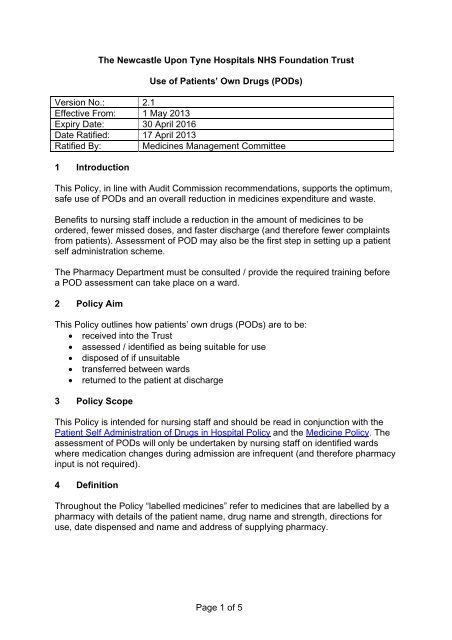
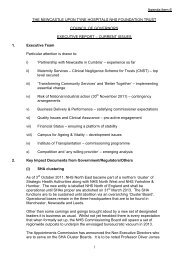
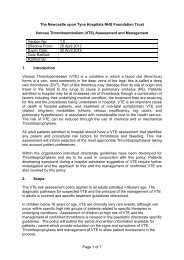
![Standard Precautions Policy - 112KB [PDF] - Newcastle Hospitals](https://img.yumpu.com/51150129/1/184x260/standard-precautions-policy-112kb-pdf-newcastle-hospitals.jpg?quality=85)
![Oxygen Management Policy - 38KB [PDF] - Newcastle Hospitals](https://img.yumpu.com/50798872/1/184x260/oxygen-management-policy-38kb-pdf-newcastle-hospitals.jpg?quality=85)
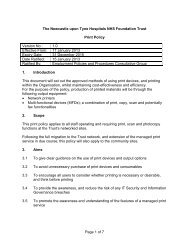
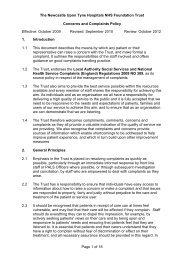
![Patient Identification Policy - 130KB [PDF] - Newcastle Hospitals](https://img.yumpu.com/49156101/1/190x245/patient-identification-policy-130kb-pdf-newcastle-hospitals.jpg?quality=85)
